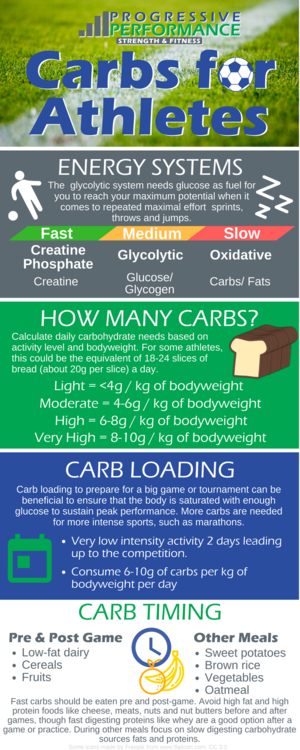Ok, so we have to talk about the ketogenic diet and its use with athletics. I have heard some coaches suggest a ketogenic or low carb diet for team sport athletes, which prompted me to write this article. Eating low carb or going on a keto diet is the worst thing an athlete can do for their performance, besides not sleeping for days on end. Especially for a team sport athlete. Before we get into why that is, we first have to talk about the different energy systems.
Your body has three main energy systems that it will use to provide energy to the body — your fast energy systems called your creatine phosphate system (alactic), your moderate energy system called your glycolytic system (lactic), and your long slow energy system called your oxidative system (aerobic). The alactic and lactic systems are both anaerobic systems, meaning they operate without the presence of oxygen in the body. The aerobic system, on the other hand, requires oxygen. The aerobic system utilizes carbohydrate and fat as a source of energy. In addition to the lactic system operating without oxygen, it is also a glucose-dependent energy system. This means that a lack of glucose in the blood will make this energy system much less robust and cause a decrease in performance. All 3 energy systems are used all the time, but the lactic and alactic systems are used a lot more in teams sports where the aerobic system is used to recover the other energy systems during recovery periods as well as in long duration exercise and at rest.
Decreased performance of the alactic and lactic systems is especially damning in sports that require a lot of sprinting. In a sport like soccer, for example, is a sport that is predominantly lactic and alactic, it requires a lot of fast sprints and periods of recovery. Soccer players also use the aerobic system to recover from the sprints. It would be extremely detrimental to a soccer player’s performance to eat low carbs. In fact, it is beneficial for a team sport athlete to add more carbs into their diets in the days leading up to a big competition so they can have the fuel to produce the energy needed to continue to play at a high level.
Table of Contents
ToggleHow Many Carbs Though?
When looking at how many carbs the athletes should be eating on a regular basis we have to look at how energy is stored in the body and how it is utilized. Energy is stored basically two ways. If an athlete eats more calories than they expend, the body will store the excess calories as adipose tissue in other words, body fat. The body fat is oxidized during aerobic exercise or during rest and recovery periods after training; basically if fewer calories and ingested than are expended.
The second form of stored energy is glucose storage. Glucose is stored as glycogen in your muscle fiber and liver. This stored carbohydrate is utilized in a process called gluconeogenesis,which is just a long word that means the creation of new glucose. This process happens when you are participating in activities that require repeated starts and stops, like most team sports. (Creatine is also a form of stored energy but is not as important to go into for the discussion at hand)
If this storage of glycogen is not fully saturated when you start participating in your sport, you are setting yourself up for a poor performance. You will not be able to produce the energy required to perform well or sustain it for the duration of your sports event. Additionally, you will not have the same ability to reach your maximum potential when it comes to repeated maximal effort drives, sprints, jumps etc.
How Much, What Type, and When: The Actionable Items
The amount of carbs is subject to change depending on the demands on the athlete. The more active an athlete is the more total calories they will need. If we base our recommendations on the bodyweight of an athlete they will look as follows for daily carbohydrate consumption.
- Light activity (low intensity skill work, no duration equivalence): <4g per kg of bodyweight
- Moderate activity (moderate to high intensity activities lasting about 1 hour per day): 4-6g per kg of bodyweight
- High activity (moderate to high intensity activities lasting 1-3 hours per day): 6-8g per kg of bodyweight
- Very High activity (moderate to high intensity activities lasting > 4 hours per day): 8-10g per kg of bodyweight
To put this into perspective using youth soccer as our example, we can calculate an average number of carbohydrates needed per day for best performance for most young soccer players.

If we assume most junior high and high school soccer players average a body weight of 60kg or 132lbs and we assume that most youth soccer players will participate in an average of about 2-3 hours of moderate to high-intensity activity per day (averaging tournaments and games, days in which more carbohydrates will be beneficial), the carbohydrate recommendation would be somewhere around 360-480g per day. Higher on tournament days and lower on non practice days. As a visual representation, 1 slice of bread is roughly 20g of carbs so that would be represented as 18-24 slices of bread a day.
Carbohydrate Loading
You may hear a lot in the media about the importance of carbohydrate loading and the timing of carbohydrates and there is a lot of truth to that, though loading may not be as effective or important as the public is lead to believe. The benefit of carb loading really depends on the type of sport you are involved in. Of course for the marathon runner or tri athlete it is imperative to load carbohydrates for a few days leading up to the big race, but for a powerlifter that makes no sense at all. The recommendations in this article are for the athletes somewhere in between.
THIS LOADING STRATEGY WILL WORK WELL FOR MOST TEAM SPORTS ATHLETES:
Very low intensity activity 2 days leading up to a competition and a consumption of 6-10g of carbohydrates per kg of body weight. The more intense or longer duration the sport, the more carbohydrates.
The whole reason for loading carbohydrates is that we need to make sure those glycogen stores in the muscle and liver, that we talked about earlier are all full when it’s game time. Using this strategy we can do that.
Carbohydrate Timing
When talking about carbohydrate timing we have to really look at the gastric emptying time (digestion time) of each nutrient. When we are closer to a competition, we want to make sure that the athlete has energy readily available to them. This means that we want the gastric emptying time of the meals surrounding and during a competition to be fast. Gastric emptying time is slowed down by foods that are high in fiber, fat and protein. Make sure that pre- and post-game meals are easily digested. Low-fat dairy products, cereals, fruits and other fast carbs should be eaten. High fat and high protein foods should be avoided like cheese, meats, nuts and nut butters.
During other times in the day, away from competitions and during carbohydrate loading, slow carbs like vegetables, sweet potatoes, brown rice and oatmeal should be the main carbohydrate sources. A majority of the fat and protein should be eaten during these meals as well.
A side note on protein: There are benefits to eating faster digesting protein around competition time for recovery, though the amount needed is not that high. If you stick with a liquid protein like whey and drink roughly 20g of it after training or a game you will be just fine.
Is sugar bad? Intra-Competition Nutrition
The short answer is ‘no, sugar is not bad.’ Sugar is actually the main ingredient in most sports drinks like Gatorade and Powerade. These products were designed to help give athletes fast acting carbohydrates so that they could play longer even while they are depleting their glycogen stores. These products are marketing hydration, which is somewhat of a concern when it is really hot out and athletes are sweating a lot, but that is not what is helping them perform so much better, it’s the sugar.
As long as the athlete is performing moderate to high-intensity exercise (a soccer goalie needs less than a midfielder) consumption of 30-60g of carbohydrates per hour from a sports drink is the recommendation for best performance.
I hear too many parents, sports coaches and even other strength coaches express that they don’t know what to recommend when it comes to athlete nutrition. According to what we know from the scientific literature, this article outlines the best way to make sure your athlete has the best chance to perform their best on the field, court, or mat. There is too much misinformation out there and I want to make sure that you have the best information regarding nutrition and sports performance.
As always, if you have any questions let me know, or if you would like to hear more and are interested in listening to me speak on any topic in fitness or sports performance for free just shoot me an email and we will make it happen.
Thanks for reading and I hope this was helpful.
Links to Research and citations
https://www.ncbi.nlm.nih.gov/pubmed/28239404 – keto diets and power production
Jeffreys, Ian, and Jeremy Moody. Strength and conditioning for sports performance. London: Routledge, Taylor & Francis Group, 2016. Print.link here
Fink, Heather Hedrick, and Alan E. Mikesky. Practical applications in sports nutrition. Burlington, MA: Jones & Bartlett Learning, 2018. Print. link here



